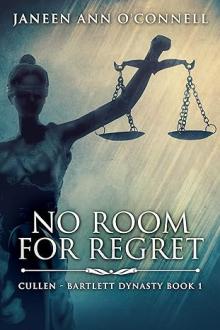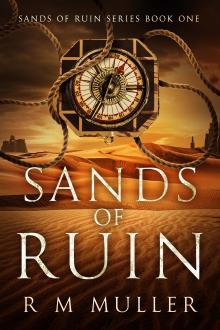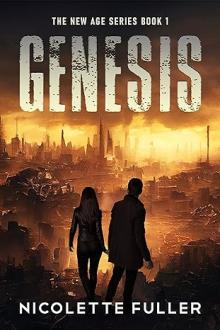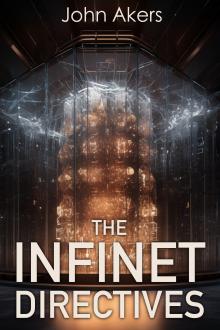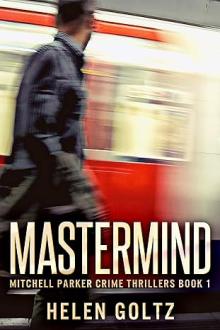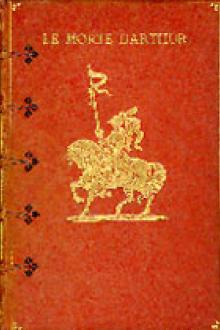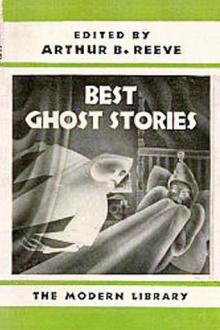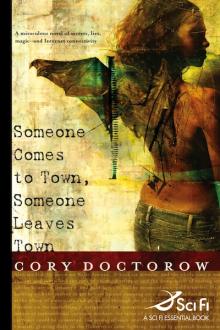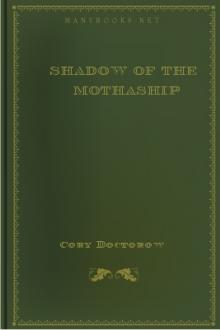Makers
Makers
Perry and Lester invent things—seashell robots that make toast, Boogie Woogie Elmo dolls that drive cars. They also invent entirely new economic systems, like the “New Work,” a New Deal for the technological era. Barefoot bankers cross the nation, microinvesting in high-tech communal mini-startups like Perry and Lester’s. Together, they transform the country, and Andrea Fleeks, a journo-turned-blogger, is there to document it.Then it slides into collapse. The New Work bust puts the dot.combomb to shame. Perry and Lester build a network of interactive rides in abandoned Wal-Marts across the land. As their rides, which commemorate the New Work’s glory days, gain in popularity, a rogue Disney executive grows jealous, and convinces the police that Perry and Lester’s 3D printers are being used to run off AK-47s.
Book Excerpt
zanne's keyboard.
She picked it up. It looked like a keychain laser-pointer, or maybe a novelty light-saber.
"Switch it on, Suzanne, please, and shine it, oh, on that wall there." Kettlewell pointed at the upholstered retractable wall that divided the hotel ballroom into two functional spaces.
Suzanne twisted the end and pointed it. A crisp rectangle of green laser-light lit up the wall.
"Now, watch this," Kettlewell said.
NOW WATCH THIS
The words materialized in the middle of the rectangle on the distant wall.
"Testing one two three," Kettlewell said.
TESTING ONE TWO THREE
"Donde esta el bano?"
WHERE IS THE BATHROOM
"What is it?" said Suzanne. Her hand wobbled a little and the distant letters danced.
WHAT IS IT
"This is a new artifact designed and executed by five previously out-of-work engineers in Athens, Georgia. They've mated a tiny Linux box with some speaker-independent continuous speech recognition software, a f
FREE EBOOKS AND DEALS
(view all)Popular books in Creative Commons, Post-1930, Fiction and Literature
Readers reviews
4.0
LoginSign up
Interesting view of "what may come." I read a semi-political, semi-economic rant once that went "we can't all sell hamburgers to each other." In this book, that's precisely what happened.
In the real world, to a far lesser extent, that is precisely what is happening now.
In the real world, to a far lesser extent, that is precisely what is happening now.
- Upvote (0)
- Downvote (0)
Doctorow scores once again. As noted by the other reviews here, it's the ideas that Doctorow puts on display, not the characters, and this novel, perhaps more than any previous work, feels a lot like a month-long perusal of BoingBoing compressed into a few days. It very much feels like a "social problem novel" of a century or two ago--imagine Elizabeth Gaskell with an Internet connection and an iphone. While certainly not his most polished work, there are no jarring passages, and the story is pleasingly homogeneous throughout, despite the frequent shifts in location and character focus noted by other reviewers. If anything, the story's a bit depressing if thought of as part of the science fiction genre--there's no grand space opera (not that Doctorow ever promised that), no overwhelming sense of the numinous in the technological, no mind-bending devices. Doctorow's always been a near-future writer (with a few exceptions, ex. True Names) but this is so VERY near as to almost seem in a different class than Eastern Standard Tribe or Magic Kingdom. It's a small novel of small drama--in twenty years, Garrison Keillor Jr. will probably be telling stories like this. Still, well-worth the reading, and despite its dissimilarity to the rest of his oeuvre, Makers is unmistakably a part of the Doctorow canon.
01/21/2010
I've been introduced to Cory Doctorow's writing only recently, and I'm pleased to know it. Makers, despite its emphatically post-industrial subject matter, is very much a modern rather than a post-modern novel. The story line runs just about straight despite occasional shifts in which character is central to the narration. Its also a decidedly American novel. The central interest of the book, for me, is not the 'almost-here' technology (intriguing as this is) but the imagining of likely social and cultural scenarios following major western recession and the embedding of information technology ever deeper in everyday living. Doctorow's central characters are nice folks, as well as being clever and creative. Even the bad guy has a few redeeming features. And the Creepy Nasty Guy gets thoroughly trounced in the end. And in the end, against the odds, its friendship, and liberal, humanitarian values that count for most. So, also a sentimental novel, but given the tough time the West is probably in for in the coming decades, this might be the one to read as the lights go out.
01/12/2010
Set sometime in the not too distant future, the garage makers and tinkerers of today, while suffering through what might be the Mother Of All Recessions, spontaneously give birth to the New Works movement. We follow the various trials and tribulations of Perry and Lester as they help kick off this new economic system and ride it to an inevitable collision with Big Business, in this case, Disney.
As with all of Doctorow's stories, ideas are on display here, not so much the characters. The repurposing of technology and just what it means to really own what you buy, when does fandom cross over into copyright infringement, and how much do we like IHOP?
The book is filled with just-around-the-corner technology and predictions. At-home 3D printers, open-source shantytown design, metabolic treatments to end obesity once and for all - at the expense of 10,000 calorie a day diets for life, and equally strange and oddly believable medical tourism in Russia.
There are some negative aspects to the book. It is unnecessarily long for the story, in my opinion. The characters bounce all over the map, Florida, Wisconsin, California, Russia, Boston, to the extent that after a while I just lost interest in who was where, and the passing of time becomes confusing, days, months, years. And Cory Doctorow must really, really hate the TSA. A lot.
But the ideas and concepts drive the book and it has those in abundance. While Makers is probably not his most polished book, overall, it is a fine addition to his collected works.
As with all of Doctorow's stories, ideas are on display here, not so much the characters. The repurposing of technology and just what it means to really own what you buy, when does fandom cross over into copyright infringement, and how much do we like IHOP?
The book is filled with just-around-the-corner technology and predictions. At-home 3D printers, open-source shantytown design, metabolic treatments to end obesity once and for all - at the expense of 10,000 calorie a day diets for life, and equally strange and oddly believable medical tourism in Russia.
There are some negative aspects to the book. It is unnecessarily long for the story, in my opinion. The characters bounce all over the map, Florida, Wisconsin, California, Russia, Boston, to the extent that after a while I just lost interest in who was where, and the passing of time becomes confusing, days, months, years. And Cory Doctorow must really, really hate the TSA. A lot.
But the ideas and concepts drive the book and it has those in abundance. While Makers is probably not his most polished book, overall, it is a fine addition to his collected works.
12/04/2009

 Free Download
Free Download

